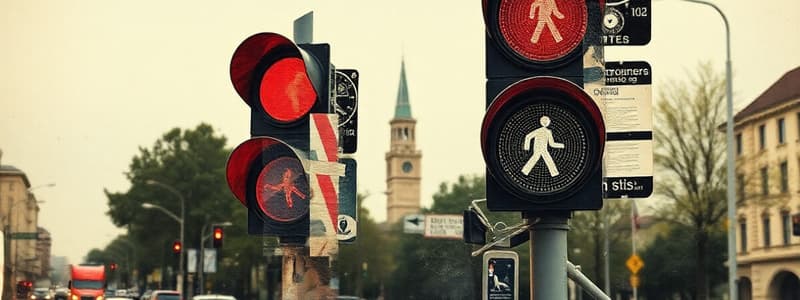Podcast
Questions and Answers
What is the average walking speed of pedestrians mentioned in the content?
What is the average walking speed of pedestrians mentioned in the content?
- 2.0 ft/s
- 4.5 ft/s (correct)
- 5.0 ft/s
- 3.0 ft/s
The MUTCD specifies an exact duration for slow crossers to begin crossing.
The MUTCD specifies an exact duration for slow crossers to begin crossing.
False (B)
What formula is used to calculate the clearance time needed for pedestrians to cross an intersection?
What formula is used to calculate the clearance time needed for pedestrians to cross an intersection?
FDW + feff > D/S_p1
The default primary design speed for pedestrians is __________ ft/s.
The default primary design speed for pedestrians is __________ ft/s.
What is the suggested clearance time for crosswalks based on the example provided?
What is the suggested clearance time for crosswalks based on the example provided?
Match the walking speed specifications with their corresponding descriptions:
Match the walking speed specifications with their corresponding descriptions:
Longer clearance times should be provided when there are many pedestrians.
Longer clearance times should be provided when there are many pedestrians.
What is the recommended walking speed in European countries such as the Netherlands?
What is the recommended walking speed in European countries such as the Netherlands?
What is a leading pedestrian interval (LPI) designed to do?
What is a leading pedestrian interval (LPI) designed to do?
Pedestrian crossing islands must be at least 8 feet deep and equipped with pedestrian signals.
Pedestrian crossing islands must be at least 8 feet deep and equipped with pedestrian signals.
What is the average delay for a three-stage crossing studied in the Boston area?
What is the average delay for a three-stage crossing studied in the Boston area?
What is the recommended minimum length for the Walk interval according to the MUTCD?
What is the recommended minimum length for the Walk interval according to the MUTCD?
The Flashing Don't Walk indication allows pedestrians to start crossing during a red clearance.
The Flashing Don't Walk indication allows pedestrians to start crossing during a red clearance.
The crossing islands must be at least __ ft deep.
The crossing islands must be at least __ ft deep.
Match the following characteristics with their descriptions:
Match the following characteristics with their descriptions:
What is the best timing option for pedestrians if a longer Walk interval is desired?
What is the best timing option for pedestrians if a longer Walk interval is desired?
The ________________ is displayed when pedestrians should not start crossing but may continue if they have already begun.
The ________________ is displayed when pedestrians should not start crossing but may continue if they have already begun.
Match the following pedestrian indications to their meanings:
Match the following pedestrian indications to their meanings:
What is the primary Standard for pedestrian start time in most of the US?
What is the primary Standard for pedestrian start time in most of the US?
Which option results in the shortest Walk interval for pedestrians?
Which option results in the shortest Walk interval for pedestrians?
Pedestrians are legally supposed to start crossing only during the FDW interval.
Pedestrians are legally supposed to start crossing only during the FDW interval.
The total length of FDW and the pedestrian phase end buffer must accommodate a pedestrian who started walking right at the end of the Walk interval.
The total length of FDW and the pedestrian phase end buffer must accommodate a pedestrian who started walking right at the end of the Walk interval.
What does 'Weff' represent in pedestrian timing?
What does 'Weff' represent in pedestrian timing?
What is the purpose of the pedestrian phase end buffer?
What is the purpose of the pedestrian phase end buffer?
The first ____ seconds of the pedestrian phase end buffer should be considered effective.
The first ____ seconds of the pedestrian phase end buffer should be considered effective.
Match the following pedestrian timing terms with their descriptions:
Match the following pedestrian timing terms with their descriptions:
Which of the following describes the 'effective pedestrian phase end buffer'?
Which of the following describes the 'effective pedestrian phase end buffer'?
There is a mandated limit on the maximum length of the pedestrian phase end buffer.
There is a mandated limit on the maximum length of the pedestrian phase end buffer.
What time is mandated by the MUTCD for pedestrian phase end buffer minimum?
What time is mandated by the MUTCD for pedestrian phase end buffer minimum?
What is the default design speed for slower pedestrians according to the MUTCD's requirement?
What is the default design speed for slower pedestrians according to the MUTCD's requirement?
The secondary clearance requirement does not need to be satisfied if the primary crossing standard is met.
The secondary clearance requirement does not need to be satisfied if the primary crossing standard is met.
What should be adjusted if the secondary requirement is not met and the crossing length is longer than 105 ft?
What should be adjusted if the secondary requirement is not met and the crossing length is longer than 105 ft?
The pedestrian phase timing includes Walk interval (W), _____, and buffer.
The pedestrian phase timing includes Walk interval (W), _____, and buffer.
Match the following pedestrian timing methods to their corresponding actions:
Match the following pedestrian timing methods to their corresponding actions:
What is the minimum value for the Walk interval (W) when setting lengths for concurrent crossings?
What is the minimum value for the Walk interval (W) when setting lengths for concurrent crossings?
In Option A, how much effective walk time do pedestrians get during the comparison of alternative pedestrian timings?
In Option A, how much effective walk time do pedestrians get during the comparison of alternative pedestrian timings?
All pedestrian intervals in non-concurrent crossings are set equal to their maximum values.
All pedestrian intervals in non-concurrent crossings are set equal to their maximum values.
Which option best serves pedestrian needs at a crossing?
Which option best serves pedestrian needs at a crossing?
The pedestrian phase should always prioritize vehicular timing needs.
The pedestrian phase should always prioritize vehicular timing needs.
What does FDW represent in the context of pedestrian timing?
What does FDW represent in the context of pedestrian timing?
The minimum split needed for vehicles is given by the equation minSplitveh = Gneeded + Y + Rc. Here, Y represents the _____ time.
The minimum split needed for vehicles is given by the equation minSplitveh = Gneeded + Y + Rc. Here, Y represents the _____ time.
Match the pedestrian and vehicle timing needs with their appropriate expressions:
Match the pedestrian and vehicle timing needs with their appropriate expressions:
What condition allows the pedestrian movement to govern the phase length?
What condition allows the pedestrian movement to govern the phase length?
A standard Walk interval of 7 seconds is always sufficient for pedestrian crossings.
A standard Walk interval of 7 seconds is always sufficient for pedestrian crossings.
What is the minimum walking interval, W~min, for pedestrian timing under normal conditions?
What is the minimum walking interval, W~min, for pedestrian timing under normal conditions?
Flashcards
Signalized Crosswalk Timing
Signalized Crosswalk Timing
Timing of pedestrian signals at intersections, considering concurrent vehicle phases.
Pedestrian Phase Options (A, B, C)
Pedestrian Phase Options (A, B, C)
Different ways to time pedestrian crossings within a vehicle phase; Option A- longest Walk; Option B - shorter Walk due to restrictions; Option C - minimum pedestrian timing.
Pedestrian Signal Indications
Pedestrian Signal Indications
Walk, Flashing Don't Walk (FDW), and Don't Walk.
Walk Interval
Walk Interval
Signup and view all the flashcards
Flashing Don't Walk (FDW)
Flashing Don't Walk (FDW)
Signup and view all the flashcards
Don't Walk Signal
Don't Walk Signal
Signup and view all the flashcards
Pedestrian Phase End Buffer
Pedestrian Phase End Buffer
Signup and view all the flashcards
Minimum Walk Interval
Minimum Walk Interval
Signup and view all the flashcards
Pedestrian Design Speed
Pedestrian Design Speed
Signup and view all the flashcards
Primary Design Speed
Primary Design Speed
Signup and view all the flashcards
Secondary Design Speed
Secondary Design Speed
Signup and view all the flashcards
Effective Phase End Buffer
Effective Phase End Buffer
Signup and view all the flashcards
Pedestrian Clearance Needs
Pedestrian Clearance Needs
Signup and view all the flashcards
Crosswalk Length
Crosswalk Length
Signup and view all the flashcards
MUTCD
MUTCD
Signup and view all the flashcards
Effective Walk Interval
Effective Walk Interval
Signup and view all the flashcards
Effective Pedestrian Phase End Buffer
Effective Pedestrian Phase End Buffer
Signup and view all the flashcards
Why is there a Pedestrian Phase End Buffer?
Why is there a Pedestrian Phase End Buffer?
Signup and view all the flashcards
Primary Pedestrian Timing Standard
Primary Pedestrian Timing Standard
Signup and view all the flashcards
Secondary Pedestrian Timing Standard
Secondary Pedestrian Timing Standard
Signup and view all the flashcards
What happens if the Pedestrian Phase End Buffer is too short?
What happens if the Pedestrian Phase End Buffer is too short?
Signup and view all the flashcards
Why is there a difference between the Effective Pedestrian Phase End Buffer and the Pedestrian Phase End Buffer?
Why is there a difference between the Effective Pedestrian Phase End Buffer and the Pedestrian Phase End Buffer?
Signup and view all the flashcards
Leading Pedestrian Interval (LPI)
Leading Pedestrian Interval (LPI)
Signup and view all the flashcards
Pedestrian Refuge Island
Pedestrian Refuge Island
Signup and view all the flashcards
Multistage Crossing
Multistage Crossing
Signup and view all the flashcards
Minimum Depth of Refuge Island
Minimum Depth of Refuge Island
Signup and view all the flashcards
Physical Median as a Crossing
Physical Median as a Crossing
Signup and view all the flashcards
Secondary Clearance Requirement
Secondary Clearance Requirement
Signup and view all the flashcards
Primary Crossing Standard
Primary Crossing Standard
Signup and view all the flashcards
Concurrent Crossing
Concurrent Crossing
Signup and view all the flashcards
Setting W and FDW
Setting W and FDW
Signup and view all the flashcards
Working Backwards in Time
Working Backwards in Time
Signup and view all the flashcards
Checking the Secondary Standard
Checking the Secondary Standard
Signup and view all the flashcards
Minimum Split for Vehicles
Minimum Split for Vehicles
Signup and view all the flashcards
Minimum Split for Pedestrians
Minimum Split for Pedestrians
Signup and view all the flashcards
Split
Split
Signup and view all the flashcards
Vehicle Timing Governs
Vehicle Timing Governs
Signup and view all the flashcards
Pedestrian Timing Governs
Pedestrian Timing Governs
Signup and view all the flashcards
Why are longer “Walk” intervals better for pedestrians?
Why are longer “Walk” intervals better for pedestrians?
Signup and view all the flashcards
Study Notes
Signalized Crosswalk Timing
- Traffic signals benefit both vehicle and pedestrian traffic.
- Most signalized crossings run concurrently with a vehicle phase.
- Figure 4-1 details three options for pedestrian timing within the vehicle phase.
- Option A: Maximizes Walk interval within the vehicle phase split.
- Option B: Includes common restrictions resulting in a shorter Walk interval (6 seconds shorter).
- Option C: Minimum pedestrian timing as required by the MUTCD.
Pedestrian Indications and Functional Intervals
- Pedestrian signals have three indications (Walk, Flashing Don't Walk, Don't Walk).
- Pedestrian timing has four intervals.
- Walk: White walking man, signals that crossing is permitted. MUTCD recommends 7 seconds minimum.
- Flashing Don't Walk (FDW): Flashing orange hand, pedestrians should not begin crossing, but continue if they have already started.
- Don't Walk (DW): Solid orange hand; displayed during two intervals, from FDW end to when conflicting traffic is released.
Effective Pedestrian Intervals
- Pedestrians are permitted to start crossing during the first few seconds of FDW.
- Effective Walk interval (Weff) = Walk interval (W) + 4.
- Effective Pedestrian Buffer (feff) length: Minimum 3 seconds. No limit on maximum feff.
- First 3 seconds of feff considered the Effective Pedestrian Buffer in practice.
Pedestrian Start Time Needs
- Primary standard: 7 seconds to start crossing (4 seconds allowable).
- Secondary Standard: 2 seconds to start crossing.
Pedestrian Clearance Needs
- Crossing time calculation: Crossing length (D) divided by walking speed.
- Pedestrian signal timing speed options:
- Sp1 = 3.5 ft/s (general pedestrians)
- Sp2 = 3.0 ft/s (slower pedestrians)
- Average pedestrian speed ~ 4.5 ft/s
Setting Walk and FDW Interval Lengths
- Pedestrian intervals (W, FDW, buffer) are set to minimum values.
- These intervals follow the primary crossing standard, and can be adjusted to meet secondary standards.
Pedestrian Timing Needs vs. Vehicle Timing Needs
- Pedestrian Phase Length is governed by Vehicle Timing when the Vehicle phase is long enough to accommodate a Pedestrian phase.
- Pedestrian Phase Length is governed by Pedestrian Timing needs when the pedestrian crossing needs more time than the vehicle movement.
Leading Pedestrian Interval (LPI)
- Used in situations where concurrent pedestrian and right-turning vehicles may conflict.
- Full Protection: Separate pedestrian phase from right-turn phase.
- Partial protection (LPI): Gives pedestrians a head start (several seconds) to establish priority before right-turning vehicle conflict.
- Typical values: 3 to 7 seconds.
Other Aspects of Pedestrian Crossings
- Crossings can be broken into stages with refuge islands (pedestrian islands), with pedestrian signals.
- Multi-stage crossings can result in excessively long delays.
- Crossings can exist in single passes where a road has a physical median which may be optional.
Studying That Suits You
Use AI to generate personalized quizzes and flashcards to suit your learning preferences.




